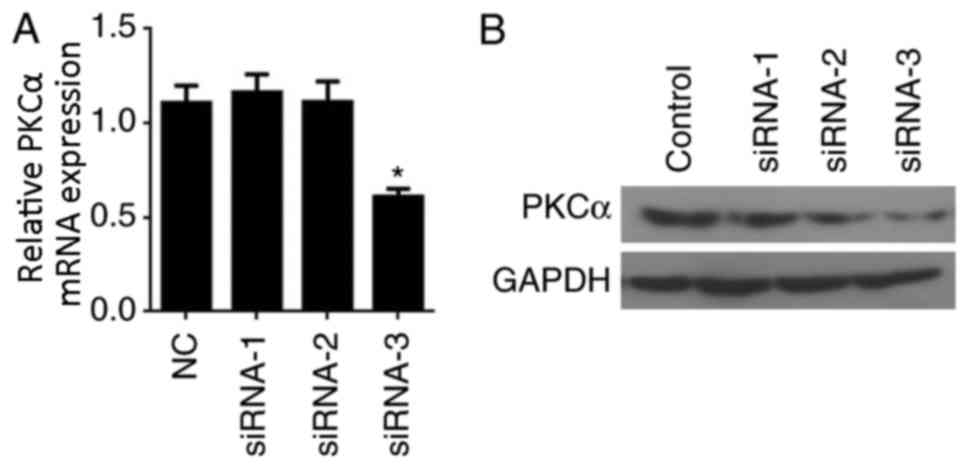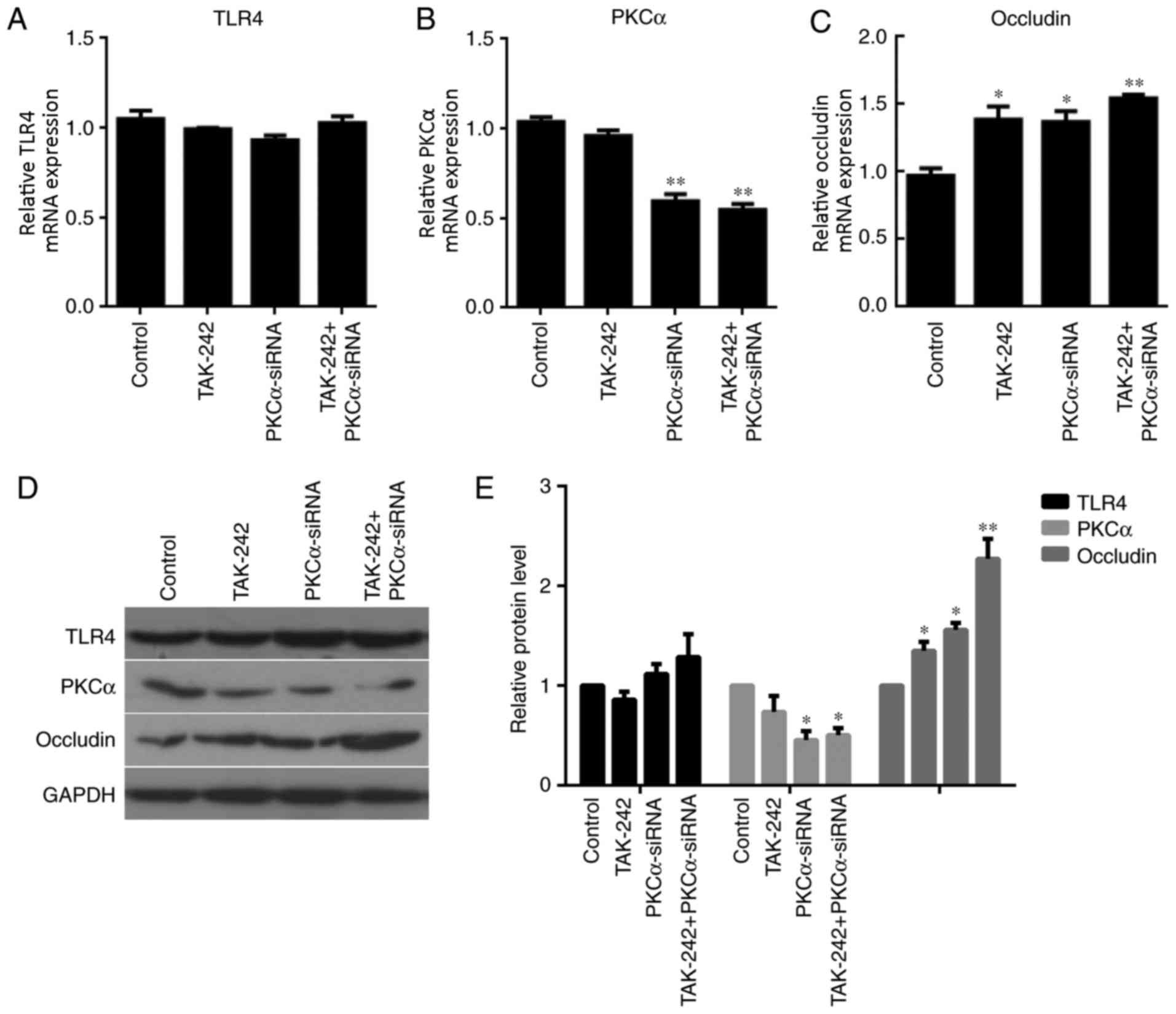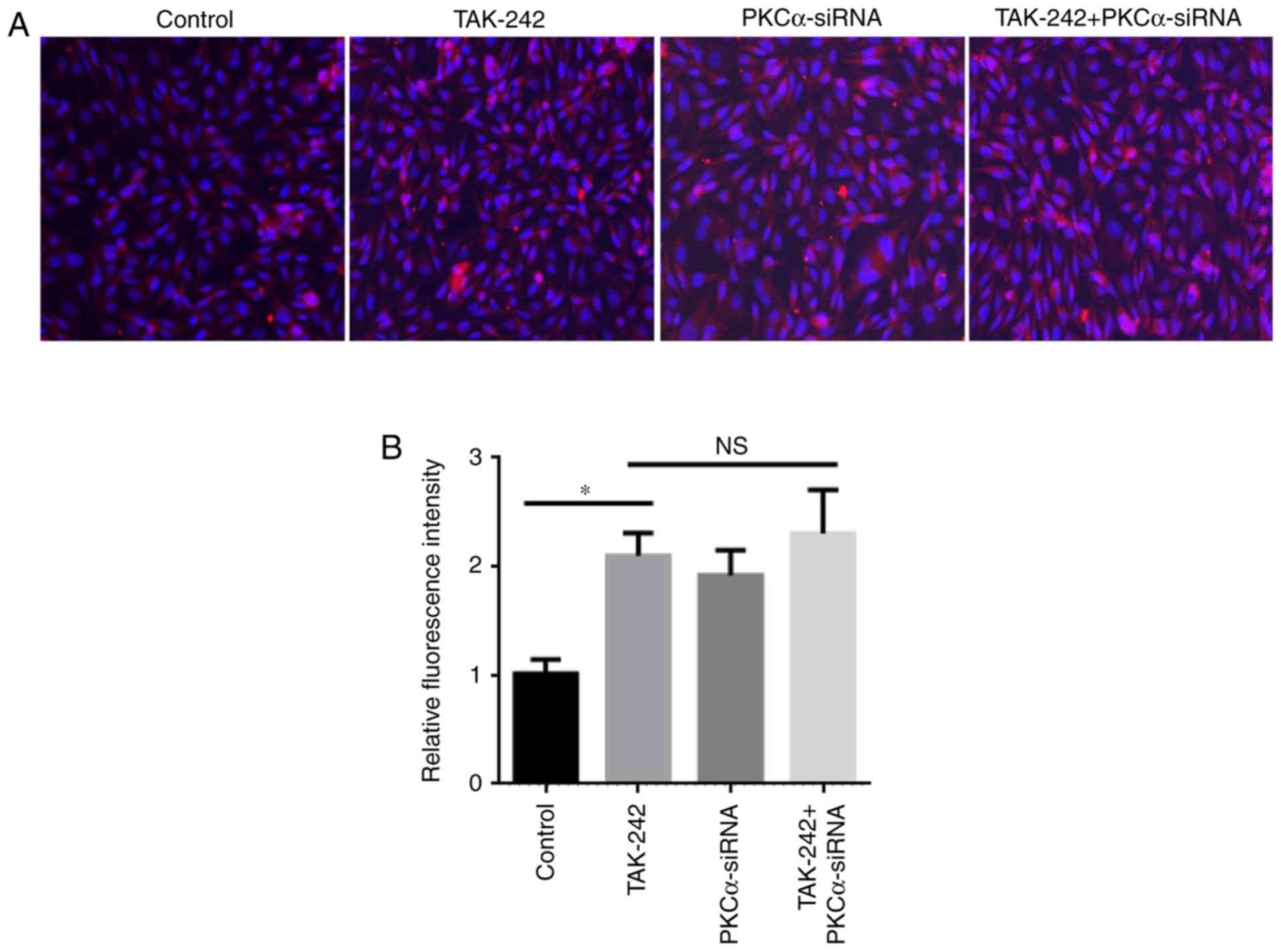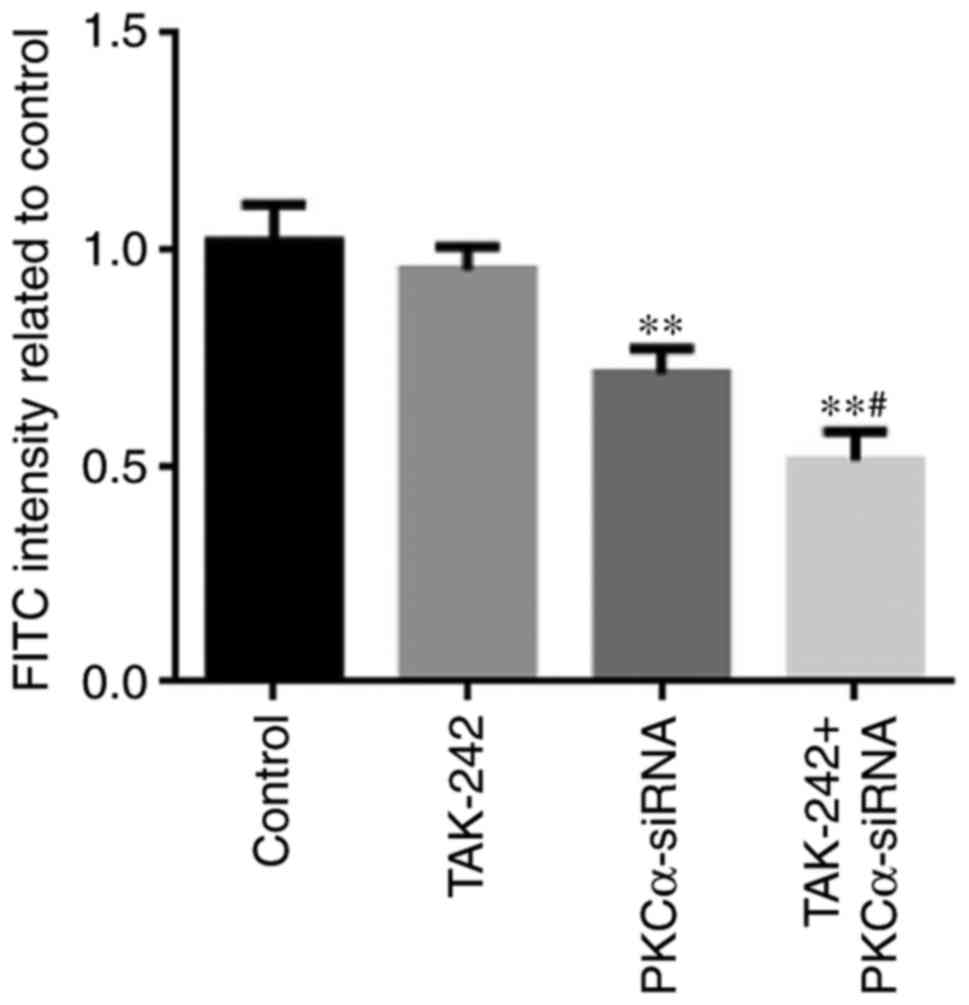|
1
|
Griepp RB, Stinson EB, Hollingsworth JF
and Buehler D: Prosthetic replacement of the aortic arch. J Thorac
Cardiovasc Surg. 70:1051–1063. 1975.PubMed/NCBI
|
|
2
|
Wypij D, Newburger JW, Rappaport LA,
duPlessis AJ, Jonas RA, Wernovsky G, Lin M and Bellinger DC: The
effect of duration of deep hypothermic circulatory arrest in infant
heart surgery on late neurodevelopment: The boston circulatory
arrest trial. J Thorac Cardiovasc Surg. 126:1397–1403. 2003.
View Article : Google Scholar : PubMed/NCBI
|
|
3
|
Ronaldson PT and Davis TP: Blood-brain
barrier integrity and glial support: Mechanisms that can be
targeted for novel therapeutic approaches in stroke. Curr Pharm
Des. 18:3624–3644. 2012. View Article : Google Scholar : PubMed/NCBI
|
|
4
|
Liu WY, Wang ZB, Zhang LC, Wei X and Li L:
Tight junction in blood-brain barrier: An overview of structure,
regulation, and regulator substances. CNS Neurosci Ther.
18:609–615. 2012. View Article : Google Scholar : PubMed/NCBI
|
|
5
|
Shin K, Fogg VC and Margolis B: Tight
junctions and cell polarity. Annu Rev Cell Dev Biol. 22:207–235.
2006. View Article : Google Scholar : PubMed/NCBI
|
|
6
|
Fanning AS and Anderson JM: Zonula
occludens-1 and −2 are cytosolic scaffolds that regulate the
assembly of cellular junctions. Ann N Y Acad Sci. 1165:113–120.
2009. View Article : Google Scholar : PubMed/NCBI
|
|
7
|
Runkle EA and Mu D: Tight junction
proteins: From barrier to tumorigenesis. Cancer Lett. 337:41–48.
2013. View Article : Google Scholar : PubMed/NCBI
|
|
8
|
Minagar A, Maghzi AH, McGee JC and
Alexander JS: Emerging roles of endothelial cells in multiple
sclerosis pathophysiology and therapy. Neurol Res. 34:738–745.
2012. View Article : Google Scholar : PubMed/NCBI
|
|
9
|
Cummins PM: Occludin: One protein, many
forms. Mol Cell Biol. 32:242–250. 2012. View Article : Google Scholar : PubMed/NCBI
|
|
10
|
Gerber J, Heinrich J and Brehm R:
Blood-testis barrier and Sertoli cell function: Lessons from
SCCx43KO mice. Reproduction. 151:R15–R27. 2016. View Article : Google Scholar : PubMed/NCBI
|
|
11
|
Capaldo CT and Nusrat A: Cytokine
regulation of tight junctions. Biochim Biophys Acta. 1788:864–871.
2009. View Article : Google Scholar : PubMed/NCBI
|
|
12
|
Krause G, Winkler L, Mueller SL, Haseloff
RF, Piontek J and Blasig IE: Structure and function of claudins.
Biochim Biophys Acta. 1778:631–645. 2008. View Article : Google Scholar : PubMed/NCBI
|
|
13
|
Vandenbroucke St Amant E, Tauseef M, Vogel
SM, Gao XP, Mehta D, Komarova YA and Malik AB: PKCα activation of
p120-catenin serine 879 phospho-switch disassembles VE-cadherin
junctions and disrupts vascular integrity. Circ Res. 111:739–749.
2012. View Article : Google Scholar : PubMed/NCBI
|
|
14
|
Singh I, Knezevic N, Ahmmed GU, Kini V,
Malik AB and Mehta D: Galphaq-TRPC6-mediated Ca2+ entry induces
RhoA activation and resultant endothelial cell shape change in
response to thrombin. J Biol Chem. 282:7833–7843. 2007. View Article : Google Scholar : PubMed/NCBI
|
|
15
|
Hutchinson TE, Zhang J, Xia SL,
Kuchibhotla S, Block ER and Patel JM: Enhanced phosphorylation of
caveolar PKC-α limits peptide internalization in lung endothelial
cells. Mol Cell Biochem. 360:309–320. 2012. View Article : Google Scholar : PubMed/NCBI
|
|
16
|
Alonso A and Gonzalez C: Neuroprotective
role of estrogens: Relationship with insulin/IGF-1 signaling. Front
Biosci (Elite Ed). 4:607–619. 2012. View
Article : Google Scholar : PubMed/NCBI
|
|
17
|
Melkamu T, Squillace D, Kita H and O'Grady
SM: Regulation of TLR2 expression and function in human airway
epithelial cells. J Membr Biol. 229:101–113. 2009. View Article : Google Scholar : PubMed/NCBI
|
|
18
|
Su W, Mruk DD and Cheng CY: Regulation of
actin dynamics and protein trafficking during
spermatogenesis-insights into a complex process. Crit Rev Biochem
Mol Biol. 48:153–172. 2013. View Article : Google Scholar : PubMed/NCBI
|
|
19
|
Cuschieri J, Billigren J and Maier RV:
Endotoxin tolerance attenuates LPS-induced TLR4 mobilization to
lipid rafts: A condition reversed by PKC activation. J Leukoc Biol.
80:1289–1297. 2006. View Article : Google Scholar : PubMed/NCBI
|
|
20
|
Li X, Wang C, Nie J, Lv D, Wang T and Xu
Y: Toll-like receptor 4 increases intestinal permeability through
up-regulation of membrane PKC activity in alcoholic
steatohepatitis. Alcohol. 47:459–465. 2013. View Article : Google Scholar : PubMed/NCBI
|
|
21
|
Peng Y, Sigua CA, Rideout D and Murr MM:
Deletion of toll-like receptor-4 downregulates protein kinase
C-zeta and attenuates liver injury in experimental pancreatitis.
Surgery. 143:679–685. 2008. View Article : Google Scholar : PubMed/NCBI
|
|
22
|
Zhang Y, Chen H and Yang L: Toll-like
receptor 4 participates in gastric mucosal protection through Cox-2
and PGE2. Dig Liver Dis. 42:472–476. 2010. View Article : Google Scholar : PubMed/NCBI
|
|
23
|
Molnár K, Vannay A, Szebeni B, Bánki NF,
Sziksz E, Cseh A, Győrffy H, Lakatos PL, Papp M, Arató A and Veres
G: Intestinal alkaline phosphatase in the colonic mucosa of
children with inflammatory bowel disease. World J Gastroenterol.
18:3254–3259. 2012.PubMed/NCBI
|
|
24
|
Eun CS, Han DS, Lee SH, Paik CH, Chung YW,
Lee J and Hahm JS: Attenuation of colonic inflammation by PPARgamma
in intestinal epithelial cells: Effect on Toll-like receptor
pathway. Dig Dis Sci. 51:693–697. 2006. View Article : Google Scholar : PubMed/NCBI
|
|
25
|
Rigor RR, Beard RS Jr, Litovka OP and Yuan
SY: Interleukin-1β-induced barrier dysfunction is signaled through
PKC-θ in human brain microvascular endothelium. Am J Physiol Cell
Physiol. 302:C1513–C1522. 2012. View Article : Google Scholar : PubMed/NCBI
|
|
26
|
Naik P and Cucullo L: In vitro blood-brain
barrier models: Current and perspective technologies. J Pharm Sci.
101:1337–1354. 2012. View Article : Google Scholar : PubMed/NCBI
|
|
27
|
Irie N, Sakai N, Ueyama T, Kajimoto T,
Shirai Y and Saito N: Subtype- and species-specific knockdown of
PKC using short interfering RNA. Biochem Biophys Res Commun.
298:738–743. 2002. View Article : Google Scholar : PubMed/NCBI
|
|
28
|
Chen C, Mei H, Shi W, Deng J, Zhang B, Guo
T, Wang H and Hu Y: EGFP-EGF1-conjugated PLGA nanoparticles for
targeted delivery of siRNA into injured brain microvascular
endothelial cells for efficient RNA interference. PLoS One.
8:e608602013. View Article : Google Scholar : PubMed/NCBI
|
|
29
|
Ii M, Matsunaga N, Hazeki K, Nakamura K,
Takashima K, Seya T, Hazeki O, Kitazaki T and Iizawa Y: A novel
cyclohexene derivative, ethyl
(6R)-6-[N-(2-Chloro-4-fluorophenyl)sulfamoyl]cyclohex-1-ene-1-carboxylate
(TAK-242), selectively inhibits toll-like receptor 4-mediated
cytokine production through suppression of intracellular signaling.
Mol Pharmacol. 69:1288–1295. 2006. View Article : Google Scholar : PubMed/NCBI
|
|
30
|
Livak KJ and Schmittgen TD: Analysis of
relative gene expression data using real-time quantitative PCR and
the 2(-Delta Delta C(T)) method. Methods. 25:402–408. 2001.
View Article : Google Scholar : PubMed/NCBI
|
|
31
|
Daneman R: The blood-brain barrier in
health and disease. Ann Neurol. 72:648–672. 2012. View Article : Google Scholar : PubMed/NCBI
|
|
32
|
You K, Xu X, Fu J, Xu S, Yue X, Yu Z and
Xue X: Hyperoxia disrupts pulmonary epithelial barrier in newborn
rats via the deterioration of occludin and ZO-1. Respir Res.
13:362012. View Article : Google Scholar : PubMed/NCBI
|
|
33
|
Fleegal MA, Hom S, Borg LK and Davis TP:
Activation of PKC modulates blood-brain barrier endothelial cell
permeability changes induced by hypoxia and posthypoxic
reoxygenation. Am J Physiol Heart Circ Physiol. 289:H2012–H2019.
2005. View Article : Google Scholar : PubMed/NCBI
|
|
34
|
Willis CL, Meske DS and Davis TP: Protein
kinase C activation modulates reversible increase in cortical
blood-brain barrier permeability and tight junction protein
expression during hypoxia and posthypoxic reoxygenation. J Cereb
Blood Flow Metab. 30:1847–1859. 2010. View Article : Google Scholar : PubMed/NCBI
|
|
35
|
Lameris AL, Huybers S, Kaukinen K, Mäkelä
TH, Bindels RJ, Hoenderop JG and Nevalainen PI: Expression
profiling of claudins in the human gastrointestinal tract in health
and during inflammatory bowel disease. Scand J Gastroenterol.
48:58–69. 2013. View Article : Google Scholar : PubMed/NCBI
|
|
36
|
dela Paz NG, Walshe TE, Leach LL,
Saint-Geniez M and D'Amore PA: Role of shear-stress-induced VEGF
expression in endothelial cell survival. J Cell Sci. 125:831–843.
2012. View Article : Google Scholar : PubMed/NCBI
|
|
37
|
Buschmann MM, Shen L, Rajapakse H, Raleigh
DR, Wang Y, Wang Y, Lingaraju A, Zha J, Abbott E, McAuley EM, et
al: Occludin OCEL-domain interactions are required for maintenance
and regulation of the tight junction barrier to macromolecular
flux. Mol Biol Cell. 24:3056–3068. 2013. View Article : Google Scholar : PubMed/NCBI
|
|
38
|
Schmidt E, Kelly SM and van der Walle CF:
Tight junction modulation and biochemical characterisation of the
zonula occludens toxin C-and N-termini. FEBS Lett. 581:2974–2980.
2007. View Article : Google Scholar : PubMed/NCBI
|
|
39
|
Lee WL and Liles WC: Endothelial
activation, dysfunction and permeability during severe infections.
Curr Opin Hematol. 18:191–196. 2011. View Article : Google Scholar : PubMed/NCBI
|
|
40
|
Speyer CL and Ward PA: Role of endothelial
chemokines and their receptors during inflammation. J Invest Surg.
24:18–27. 2011. View Article : Google Scholar : PubMed/NCBI
|
|
41
|
Lamalice L, Le Boeuf F and Huot J:
Endothelial cell migration during angiogenesis. Circ Res.
100:782–794. 2007. View Article : Google Scholar : PubMed/NCBI
|
|
42
|
Tremblay PL, Auger FA and Huot J:
Regulation of transendothelial migration of colon cancer cells by
E-selectin-mediated activation of p38 and ERK MAP kinases.
Oncogene. 25:6563–6573. 2006. View Article : Google Scholar : PubMed/NCBI
|
|
43
|
Schulz E, Gori T and Munzel T: Oxidative
stress and endothelial dysfunction in hypertension. Hypertens Res.
34:665–673. 2011. View Article : Google Scholar : PubMed/NCBI
|
|
44
|
Ulluwishewa D, Anderson RC, McNabb WC,
Moughan PJ, Wells JM and Roy NC: Regulation of tight junction
permeability by intestinal bacteria and dietary components. J Nutr.
141:769–776. 2011. View Article : Google Scholar : PubMed/NCBI
|
|
45
|
González-Mariscal L, Tapia R and Chamorro
D: Crosstalk of tight junction components with signaling pathways.
Biochim Biophys Acta. 1778:729–756. 2008. View Article : Google Scholar : PubMed/NCBI
|
|
46
|
Wardill HR, Gibson RJ, Logan RM and Bowen
JM: TLR4/PKC-mediated tight junction modulation: A clinical marker
of chemotherapy-induced gut toxicity? Int J Cancer. 135:2483–2792.
2014. View Article : Google Scholar : PubMed/NCBI
|
|
47
|
Matsunaga N, Tsuchimori N, Matsumoto T and
Ii M: TAK-242 (resatorvid), a small-molecule inhibitor of Toll-like
receptor (TLR) 4 signaling, binds selectively to TLR4 and
interferes with interactions between TLR4 and its adaptor
molecules. Mol Pharmacol. 79:34–41. 2011. View Article : Google Scholar : PubMed/NCBI
|


















